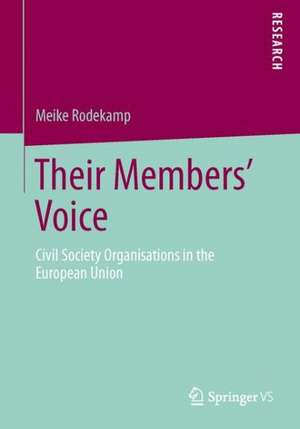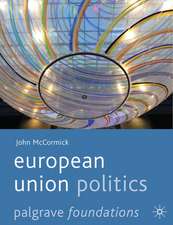Their Members' Voice: Civil Society Organisations in the European Union
Autor Meike Rodekampen Limba Engleză Paperback – 27 iun 2013
Preț: 387.58 lei
Nou
Puncte Express: 581
Preț estimativ în valută:
74.18€ • 77.24$ • 62.69£
74.18€ • 77.24$ • 62.69£
Carte tipărită la comandă
Livrare economică 10-24 martie
Preluare comenzi: 021 569.72.76
Specificații
ISBN-13: 9783658022129
ISBN-10: 3658022124
Pagini: 306
Ilustrații: XVI, 290 p. 19 illus.
Dimensiuni: 148 x 210 x 20 mm
Greutate: 0.4 kg
Ediția:2014
Editura: Springer Fachmedien Wiesbaden
Colecția Springer VS
Locul publicării:Wiesbaden, Germany
ISBN-10: 3658022124
Pagini: 306
Ilustrații: XVI, 290 p. 19 illus.
Dimensiuni: 148 x 210 x 20 mm
Greutate: 0.4 kg
Ediția:2014
Editura: Springer Fachmedien Wiesbaden
Colecția Springer VS
Locul publicării:Wiesbaden, Germany
Public țintă
ResearchCuprins
The Representative Role of Civil Society Organisations in Democracy.- Methods, Case Selection, and the Civil Society Organisation Sample.- The Formal and the Relational Dimension of Civil Society Organisation Representativeness.
Notă biografică
Dr. Meike Rodekamp works as a policy analyst for the German Council of Science and Humanities (Wissenschaftsrat) in Cologne, Germany.
Textul de pe ultima copertă
The role of civil society organisations in Brussels is debated. Some view them as representatives of their members and thus as legitimising agents for policy-making in the European Union. Others see them as being elitist and out of touch with their membership bases, therefore ill-suited to promote democracy at the EU level. Taking civil society organisations in the EU’s external relations as an example, Meike Rodekamp submits these controversial views to a reality check. Interviews with representatives of civil society organisations in Brussels and their member organisations in the EU show that the Brussels offices have not lost contact with their members. However, member organisations differ substantially in their participation in internal decision-making processes, which raises doubts about the legitimacy gains through civil society participation in EU policy-making.
Contents
· The Representative Role of Civil Society Organisations in Democracy
· Methods, Case Selection, and the Civil Society Organisation Sample
· The Formal and the Relational Dimension of Civil Society Organisation Representativeness
Target Groups
· Researchers and students of political science, in particular in the fields of EU integration, global governance, NGO research, anddemocratisation
· Practitioners of EU politics, in particular EU institution officials, NGO and business association representatives, government representatives, lobbyists in general
The Author
Dr. Meike Rodekamp works as a policy analyst for the German Council of Science and Humanities (Wissenschaftsrat) in Cologne, Germany.
Contents
· The Representative Role of Civil Society Organisations in Democracy
· Methods, Case Selection, and the Civil Society Organisation Sample
· The Formal and the Relational Dimension of Civil Society Organisation Representativeness
Target Groups
· Researchers and students of political science, in particular in the fields of EU integration, global governance, NGO research, anddemocratisation
· Practitioners of EU politics, in particular EU institution officials, NGO and business association representatives, government representatives, lobbyists in general
The Author
Dr. Meike Rodekamp works as a policy analyst for the German Council of Science and Humanities (Wissenschaftsrat) in Cologne, Germany.
Caracteristici
Publication in the field of social sciences


















